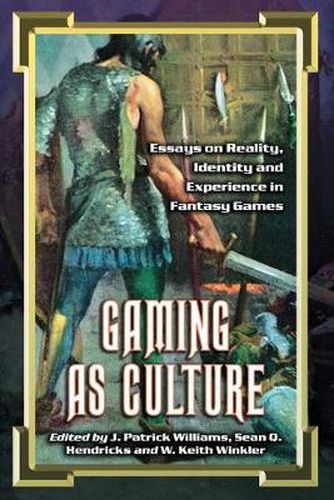Readings Newsletter
Become a Readings Member to make your shopping experience even easier.
Sign in or sign up for free!
You’re not far away from qualifying for FREE standard shipping within Australia
You’ve qualified for FREE standard shipping within Australia
The cart is loading…






This title is printed to order. This book may have been self-published. If so, we cannot guarantee the quality of the content. In the main most books will have gone through the editing process however some may not. We therefore suggest that you be aware of this before ordering this book. If in doubt check either the author or publisher’s details as we are unable to accept any returns unless they are faulty. Please contact us if you have any questions.
Perhaps the fastest growing facet of American popular culture, the video game industry is Hollywood’s premier rival in the entertainment business. But stacks of new releases for gaming enthusiasts mean more than just boom season for a burgeoning industry. Since tabletop fantasy role-playing games emerged in the 1970s, fantasy gaming has made a unique contribution to popular culture and perceptions of social realities in America. This book presents the most current research in fantasy games and examines the cultural and constructionist dimensions of fantasy gaming as a leisure activity. Each chapter investigates some social or behavioural aspect of fantasy gaming and provides insight into the cultural, linguistic, sociological, and psychological impact of games on both the individual and society. Section I discusses the intersection of fantasy and real-world scenarios and how the construction of a fantasy world is dialectically related to the construction of a gamer’s social reality. Because the basic premise of fantasy gaming is the assumption of virtual identities, Section II looks at the relationship between gaming and various aspects of identity. The third and final section examines what the personal experiences of gamers can tell us about how humans experience reality. These concluding studies assess the pedagogical value of fantasy games in terms of both formal education and social morality.
$9.00 standard shipping within Australia
FREE standard shipping within Australia for orders over $100.00
Express & International shipping calculated at checkout
This title is printed to order. This book may have been self-published. If so, we cannot guarantee the quality of the content. In the main most books will have gone through the editing process however some may not. We therefore suggest that you be aware of this before ordering this book. If in doubt check either the author or publisher’s details as we are unable to accept any returns unless they are faulty. Please contact us if you have any questions.
Perhaps the fastest growing facet of American popular culture, the video game industry is Hollywood’s premier rival in the entertainment business. But stacks of new releases for gaming enthusiasts mean more than just boom season for a burgeoning industry. Since tabletop fantasy role-playing games emerged in the 1970s, fantasy gaming has made a unique contribution to popular culture and perceptions of social realities in America. This book presents the most current research in fantasy games and examines the cultural and constructionist dimensions of fantasy gaming as a leisure activity. Each chapter investigates some social or behavioural aspect of fantasy gaming and provides insight into the cultural, linguistic, sociological, and psychological impact of games on both the individual and society. Section I discusses the intersection of fantasy and real-world scenarios and how the construction of a fantasy world is dialectically related to the construction of a gamer’s social reality. Because the basic premise of fantasy gaming is the assumption of virtual identities, Section II looks at the relationship between gaming and various aspects of identity. The third and final section examines what the personal experiences of gamers can tell us about how humans experience reality. These concluding studies assess the pedagogical value of fantasy games in terms of both formal education and social morality.